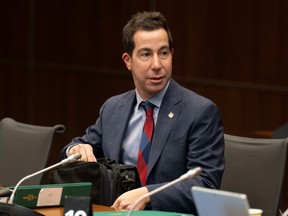Several MPs wrote to the leaders of Canada’s largest universities last month asking them detailed questions about their policies around antisemitism

OTTAWA — Calling for the genocide of the Jewish people would violate school policies on antisemitism, Canada’s major universities say — but they are largely quiet on whether urging the eradication of the state of Israel would meet the same standard.
A group of members of Parliament put that question to 27 different institutions in response to the mounting antisemitic rhetoric that followed the start of Israel’s war on Hamas.
That war, precipitated by the deadly terrorist attacks on civilians in southern Israel last October, has left more than 25,000 Palestinians dead, including many children, Hamas officials in Gaza say.
Since it began, police across Canada have reported a sharp spike in antisemitic hate crimes. Local Jewish leaders say they are living with fears they have not experienced in generations.
Liberal MP Anthony Housefather, who is himself Jewish, was among several MPs who wrote to the leaders of Canada’s largest universities last month asking them detailed questions about their policies around antisemitism.
Others included fellow Montreal Liberals David Lametti and Anna Gainey, along with Winnipeg MP Ben Carr and Marco Mendicino, who represents a Toronto riding.
The parliamentarians asked school presidents to provide written answers to a set of questions, including whether calling for genocide of the Jewish people or the elimination of the state of Israel would violate their rules.
The responses, which Housefather released Wednesday, all say calling for genocide would run afoul of university policy, regardless of context — a uniform response welcomed by the Montreal MP.
It also stands in stark contrast to some of the answers provided by the heads of U.S. schools last year during congressional hearings on antisemitism on campus.
Former University of Pennsylvania president Liz Magill ultimately resigned after initially telling lawmakers that decisions about what would violate a school’s conduct policy are “context-dependent.”
On the question of how Canadian universities might handle calls for the destruction of Israel, the answers were less plentiful and more nuanced, Housefather said.
Only eight of 27 responded to the question, some more directly than others, he said: “Sometimes it’s a little bit more subtle.”
What was clear is that some of the presidents viewed the question as being more “complex” and therefore tried to be more careful with their answers.
“I would hope that the call for the eradication of a nation, which is a form of genocide — that would also be covered,” Housefather said in an interview.
Only three said unequivocally that direct statements demanding Israel’s elimination would violate school policy.
The head of Queen’s University said in a Jan. 18 letter that “a call for the elimination of the state of Israel would be considered a form of discriminatory harassment.”
Principal and vice-chancellor Patrick Deane added that “the call for genocide is a call for violence and death,” and “there is no debate that such a call is unequivocally wrong and carries penalties beyond the university’s purview.”
“The call for the elimination of the state of Israel, or any other state, can reasonably be interpreted as a call for violence against the people within that state and as such would constitute a violation of our policies,” wrote University of Manitoba president Michael Benarroch.
By making the letters public, Housefather said he hopes people will better understand where individual universities stand on issues pertaining to antisemitism, including their specific efforts to protect Jewish students.
“There was a great fear and discontent across the board” among students, faculty members and their families — and “that has not magically changed” over time, he said.
Housefather said he still hears about issues cropping up almost daily on university campuses. They can be dealt with by educating people and schools implementing their existing policies, he added.
“Do I think things are a little better? Yes, I think things are generally a little bit better, but there’s still lots of problems.”
A parliamentary committee should undertake the study of antisemitism as a whole, not just on post-secondary campuses, he added.
— With additional reporting from The Associated Press.
Our website is the place for the latest breaking news, exclusive scoops, longreads and provocative commentary. Please bookmark nationalpost.com and sign up for our daily newsletter, Posted, here.